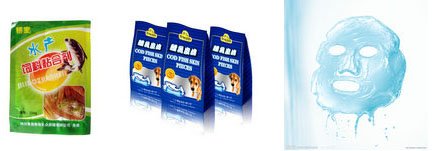b

Thank You!
Your requirement has been sent, we will contact you quickly!
Sent Failed!
Try again!
Sodium alginate,also called as Algin, is a kind of white or light yellow granular or powder, almost odorless and tasteless. It is a macromolecular compound with high viscosity, and a typical hydrophilic colloids. Because of its properties of stability, thickening and emulsifying, hydratability and gelling property, it is widely used in food, pharmaceutical, printing and dyeing, etc.
The typical application of stability:
Sodium alginate is used to replace starch, gelatin as the stabilizer of ice cream, controlling the formation of ice crystals and improving the flavor of ice cream. It can also stabilize mixed beverages like sugar ice cream, sherbet, frozen milk etc. Many dairy products such as refined cheese, whipped cream, cream cheese, rely on the stabilization of sodium alginate to prevent the attachment of food and packaging materials .If it is used as the covering of milk on ornaments, the sodium alginate can make it stable and prevent icing sugar pastry cracking.

The typical application of thickening and emulsifying:
Sodium alginate is used as thickening agent of salad-dressing, pudding, jam, ketchup and canned products, to enhance the stability of products and reduce fluid exudation.

The typical application of hydratability:
Adding in sodium alginate while making fine dried noodles, vermicelli, rice flour can improve the adhesion of products tissue, making them with high tensile strength, curvature, reducing the end breakage rate, especially obvious for low gluten flour. Adding in bread, cakes and some other products can improve the uniformity and water retention ability of these products internal organizations, and extend the storage time. Adding in the frozen dessert products can provide a protective shield for hot fusion, improve flavor loss and the melting point.

The typical application of gelation:
Sodium alginate can be made into various gel food. It can be used to maintain good colloid form, without drainage or shrinkage, suitable for frozen food and man-made imitation food. It can also be used as layers of protective coating to cover fruit, meat, poultry and aquatic products, making them without direct contact with air, thus extending the storage time. Added in sugarcoating of bread, stuffed filling, cover layer of dessert, canned food, etc, it is a good type of self-curing forming agent, making products maintain the original shape at high temperature, freezing and acidic media. Taking the place of agar, it can also be made into flexible, non-stick tooth, transparent crystal candy.
Sodium alginate is a indispensable dietary fibre for our body with unique nutrition. Combined with organic matter, it can decrease cholesterol in serum and liver, so as to inhibit the increase of total fat and fatty acid concentration. Besides, it can also improve the digestion and absorption of nutrient, at the same time inhibit the absorption of harmful elements such as radioactive strontium, cadmium etc. Long-term consumption of health food with sodium alginate can help cure hypertension, coronary heart disease, obesity, diabetes and intestinal tract diseases etc.
In addition, sodium alginate can also be used as feed binder, pet food binder, monomer raw materials of cosmetics.

Executive standard:
National standard GB1976–2008, Based on the requirements of customers, products in accordance with E401, FCC III can also be produced.
Item | GB1976-2008 |
Color and characteristics | Milk white to light yellow or light brown powder or granular |
PH | 6.0~8.0 |
Moisture /% | ≤15.0 |
Ash ( on dry basis) / % | 18~27 |
Water-insoluble /% | ≤0.6 |
Transmittance/% | Qualified |
Lead(Pb)/(mg/kg) | ≤4 |
Arsenic(As)/(mg/kg) | ≤2 |
Packaging specifications
25kg poly woven bag

